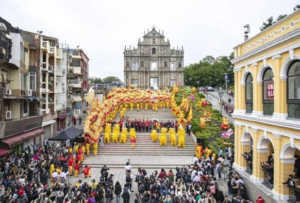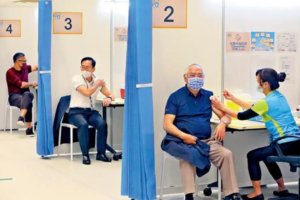
Chinese passengers to Thailand and Japan cut their teeth: there are welcome banners and nucleic acid tests
Since December 2022, China has been continuously optimizing and adjusting its anti-epidemic policy, which is generally viewed positively by the international community as a strong recovery of the Chinese economy, which will have a boosting effect on the stability and growth of the global economy.
Along with the optimization of the epidemic prevention policy, the number of Chinese citizens leaving the country is in an orderly process of recovery and increase. At the same time, the international community reflects a certain degree of difference in response to China.
In Southeast Asia, Thai Deputy Prime Minister and Health Minister Anutin personally greeted Chinese tourists at Bangkok’s Suvarnabhumi Airport on January 9, 2023, where he also stated on the spot that Thailand had rescinded a previously announced entry policy that no longer required international travelers to show proof of vaccination for the new crown. Anutin noted that if tourists are diagnosed within Thailand, they can be treated at a hospital and need not worry. If a tourist wishes to be vaccinated in Thailand, he or she can do so after paying the relevant fee.
In addition to the “welcome by the deputy prime minister”, what kind of personal experience do the entry measures of each country bring to Chinese passengers? This reporter recently contacted a number of compatriots who traveled to Thailand and Japan after the reopening.
Thailand: warm and touching
“I was touched when I got off the plane and saw the staff pulling a banner at the entrance to welcome us, the banner said ‘China and Thailand are one family’ and the staff said ‘Welcome people from China’.” Ai, who entered Thailand on Jan. 9, told reporters, “Then again, Thai officials came to hand us flower garlands and give us bags and small gifts, which was very thoughtful. Then they also said in Chinese, ‘Hello, welcome to Thailand.’ I felt very happy, they kinda value us Chinese tourists.”
“I was landing in Thailand to enter the customs was very smooth, because I was holding a student visa, and like those who took the visa on arrival, they went to fill out the form, I was going directly to pick up my luggage.” Xiao Ai told reporters, “At that time is the line of entry, the airport is quite a lot of people, the line has to have 20 to 30 minutes, after the line to me, the information, tickets and passports are given to the immigration staff, and then he looked at half a day, did not ask any questions, and finally he asked what I was studying, and asked where to live after leaving the airport. “
“I answered him in Thai and said I was a media major, and after leaving the airport was going to the dormitory across the street from the school, and then he asked why I knew Thai? Because he probably thought I was an international college student, I said I prefer to learn foreign languages, so I learned two foreign languages, Thai and English, and finally he said he gave me the clearance stamp, handed me the information, said I should study well, and then I left the airport.”
“The information I handed him then was my student visa, flight itinerary, and proof of vaccinations, I didn’t prepare any nucleic acid certificate or insurance, and he didn’t bother to ask me for anything else.” Ai said, “When you ask the airport staff anything, they are very enthusiastic to answer you and give you directions.”
In an interview with reporters, Daliu, a Chinese tourist who entered Thailand on Jan. 9, said his process also went smoothly.
“I was crossing the border from Shenzhen to Hong Kong to catch a flight, and before boarding, the customs at the Hong Kong airport did not look at my insurance, and there were no examples of over-management such as card insurance not being given over that day. After landing in Thailand, I filled out the entry card, the cost of the visa on arrival was 2,000 baht (about 405 yuan), in addition I gave the staff a tip of 200 baht, after which the Thai customs officers looked at my airline ticket hotel order, a few minutes to enter Thailand smoothly.” Daliu said.
Qingmo, another Chinese tourist who entered Thailand on Jan. 10, told reporters that he took a flight to Thailand at Kunming Changshui International Airport, “no need to do nuclear acid, customs only looked at my return ticket, hotel order and new crown insurance.” Qing Mo said he felt good after landing in Thailand, the staff was very enthusiastic, “nothing to see, stamped directly through customs.”
In the face of a gradual recovery in tourism, Thai Finance Minister Akon Dembidayabaisi recently said that although the world economy is facing downward pressure, but the return of Chinese tourists and other favorable factors are expected to drive Thailand to achieve this year’s economic growth target of 3.8%.

A passenger on a direct flight from mainland China to Japan arrives at a quarantine booth at Narita Airport in Chiba Prefecture to undergo quantitative antigen testing through the boarding gate on Jan. 12, 2023.
Japan: Japanese people on the same flight also do nucleic acid off the plane
At the same time, there are some countries that have taken targeted anti-epidemic measures for Chinese tourists entering their country.
According to the official news released by Japan, from January 8, Japan requires passengers entering Japan from China, regardless of any vaccination, to undergo nucleic acid testing within 72 hours before leaving the country and present a certificate of nucleic acid testing issued by a medical institution. Those who have stayed in mainland China within 7 days prior to entering Japan and those who have flown directly from mainland China to Japan will be tested upon arrival in Japan and will be quarantined if they test positive.
Chen, who arrived at Narita Airport in Tokyo on January 12 to work in Japan, told reporters that the 72-hour negative nucleic acid certificate should preferably be in English or Japanese, and if it is in Chinese, it should be accompanied by a declaration form. These are available to board the plane.
When asked if there was a staff member to give the Chinese tourists who entered Japan a relevant sign to wear after landing in Japan, Xiao Chen said that the staff member only put a sticker on his sleeve, which says the same number as the one on the passport when the nucleic acid test is done, “because they want to take away our passports, resident cards (editor’s note: issued by the Japanese government to foreigners residing in Japan for a medium to long period of time) foreigners issued by the Japanese government to mid- to long-term residents in Japan), and airline tickets, and on our return, they returned the aforementioned documents to us against the number on our sleeves.”
“After landing, you have to go for the nucleic acid test, the test method is to spit into the tube, spit to a certain amount, and then wait for the test results, the negative ones can enter the country, the positive ones have to be pulled away to the hotel for isolation.” Xiao Chen said he was quarantined due to a positive nucleic acid test result, “if there are no symptoms, after 5 days of isolation will give you nucleic acid, the results are negative, the sixth day of the morning can leave the isolation hotel. However, the staff are quite nice. When I first learned that my result was positive, I was very depressed and they were very patient and reassuring.”
Chen pointed out that from the time he boarded the bus to his room at the quarantine hotel, the luggage was carried by the staff, “Their attitude is fine, I am satisfied. I just hope they can handle positive passengers faster, from 1:30 p.m. to wait for the nucleic acid results, to 8 p.m. to step into the hotel room, the process is too tiring to wait.”
Another Chinese tourist who arrived in Japan on January 11, Buried told reporters that he also did a nucleic acid test immediately after landing, and the results came out an hour later, “there are Japanese people on the same flight, they also have to do nucleic acid off the plane, and also wait for the results.”
Chinese Foreign Ministry spokesman Wang Wenbin said on Jan. 11 in response to related questions that we have repeatedly pointed out that a few countries have ignored the scientific basis and the reality of the epidemic in their own countries and insisted on taking discriminatory entry restrictions on travelers from China. We once again call on the relevant countries to develop epidemic prevention measures scientifically and appropriately from the facts, and all parties to work together to create favorable conditions for normal personnel exchanges and cooperation.


Average Rating